01.01. Dokumentazio profesionala eta militantea
Fitxa multzoa
- Identificador (rico:identifier)
- ME_A 01.01.
- Tiene como tipo de agrupación documental (rico:hasRecordSetType)
- eu Sekzioa
- Título (rico:title)
- eu 01.01. Dokumentazio profesionala eta militantea
- es 01.01. Documentación profesional y militante
- en 01.01. Professional and militant documentation
- incluye o incluía (rico:includesOrIncluded)
- 01.01.01. Dokumentazio akademikoa
-
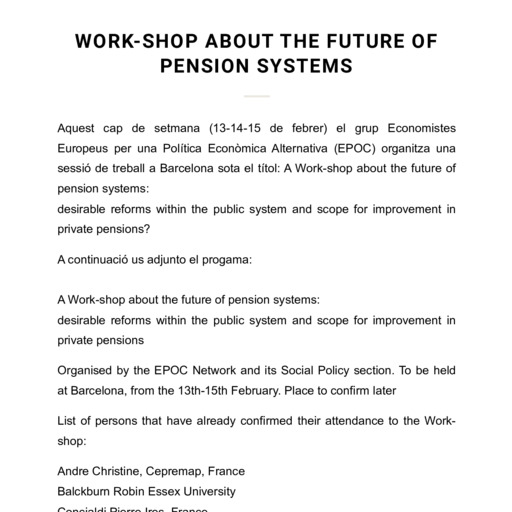 01.01.02. Europako ekonomialariak Europan politika ekonomiko alternatibo baten alde (EuroMemo Taldea)
01.01.02. Europako ekonomialariak Europan politika ekonomiko alternatibo baten alde (EuroMemo Taldea)
- 01.01.03. Seminari d'Economia Critica TAIFA
- Baliabide klasea
- Record Set
Fitxak
-
Documentación incluida en Working papers (Universitat Autònoma de Barcelona. Departament d'Economia Aplicada)
-
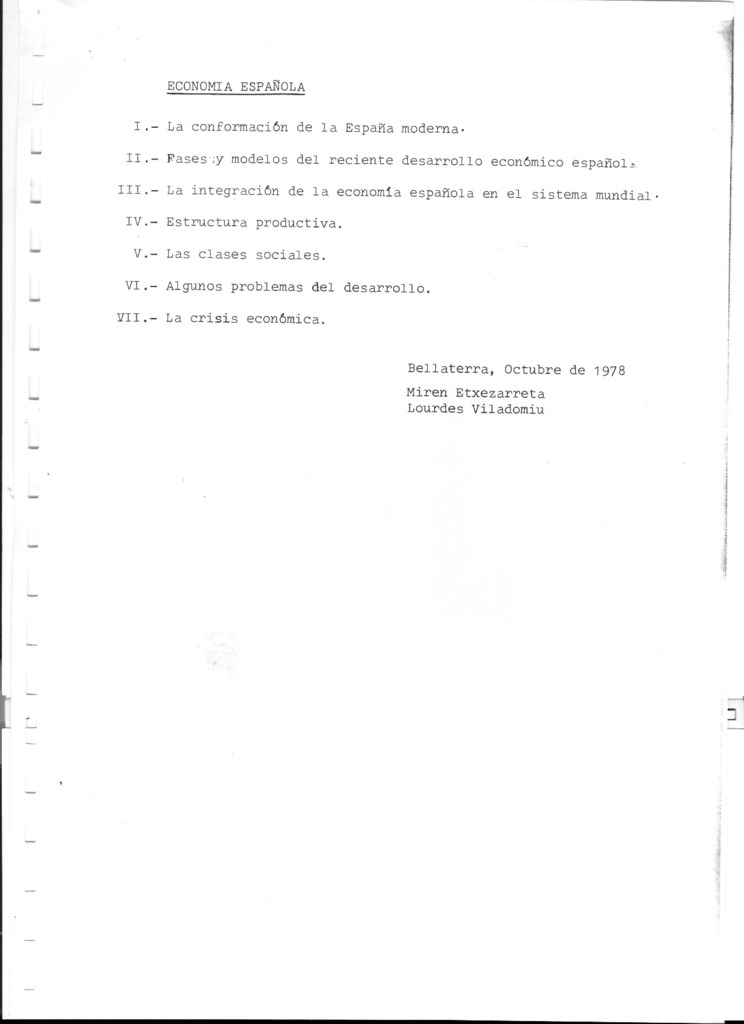 Economia espanyola [0000], Guies docents
Economia espanyola [0000], Guies docents -
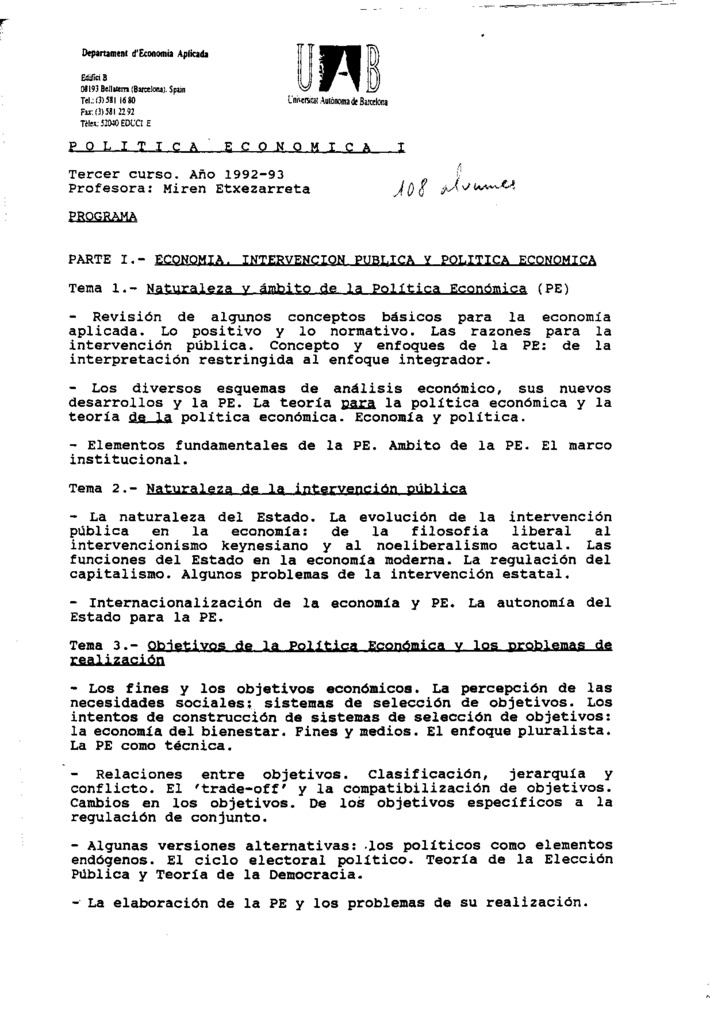 POLITICA ECONOMICA I [10018]. Tercer curso. Año 1992-93 Guies docents
POLITICA ECONOMICA I [10018]. Tercer curso. Año 1992-93 Guies docents -
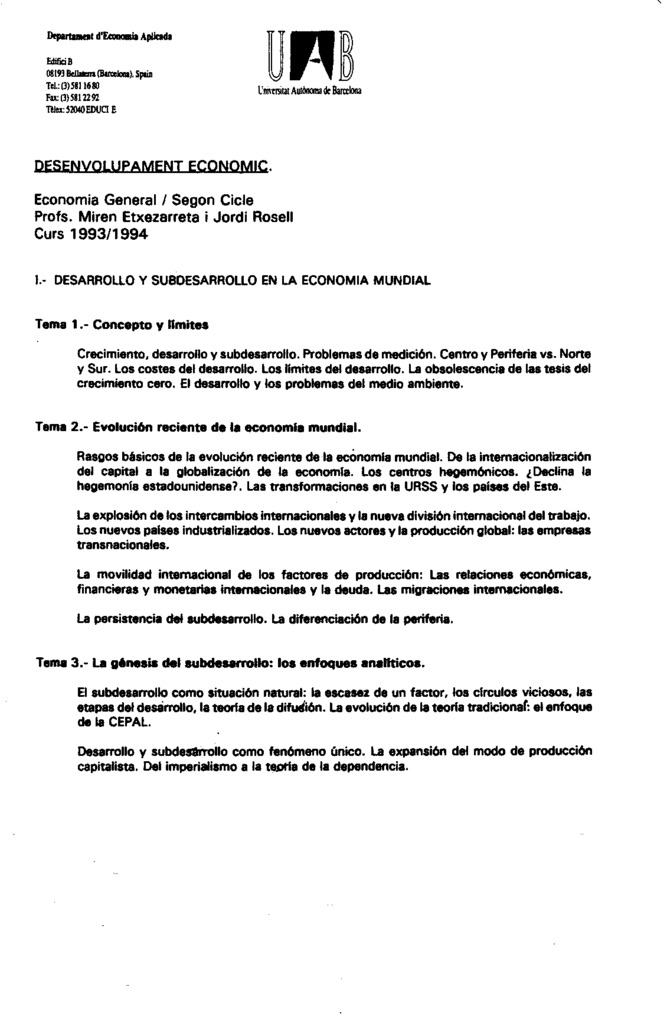 Desenvolupament Econòmic [22607] Economia General / Segon Cicle Profs. Miren Etxezarreta i Jordi Rose" Curs , 1993/1994 Course guides
Desenvolupament Econòmic [22607] Economia General / Segon Cicle Profs. Miren Etxezarreta i Jordi Rose" Curs , 1993/1994 Course guides -
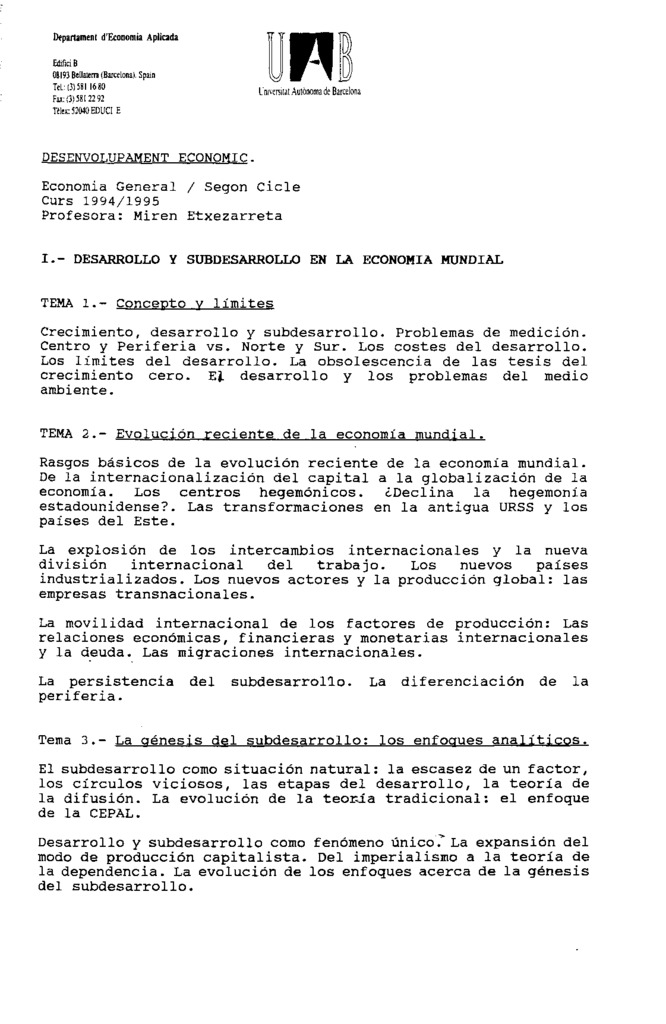 DESENVOLUPAMENT ECONOMIC [10025] Economia General / Segon Cicle Curs 1994/1995 Course guides
DESENVOLUPAMENT ECONOMIC [10025] Economia General / Segon Cicle Curs 1994/1995 Course guides -
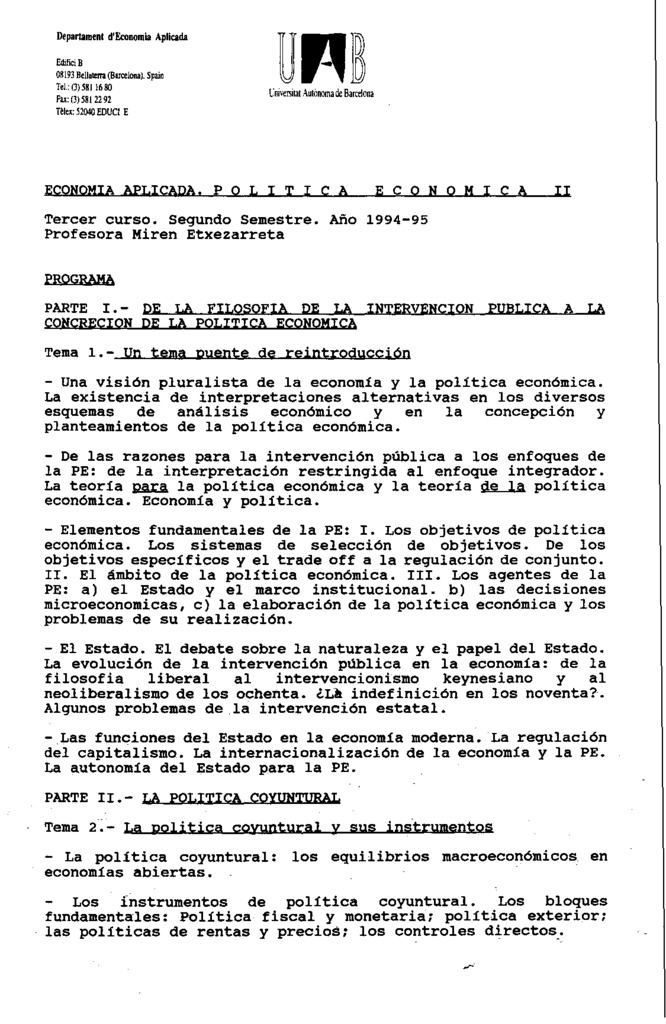 Economía Aplicada. Política económica II [22345] Tercer curso. Segundo Semestre. Año 1994-95 Course guides
Economía Aplicada. Política económica II [22345] Tercer curso. Segundo Semestre. Año 1994-95 Course guides -
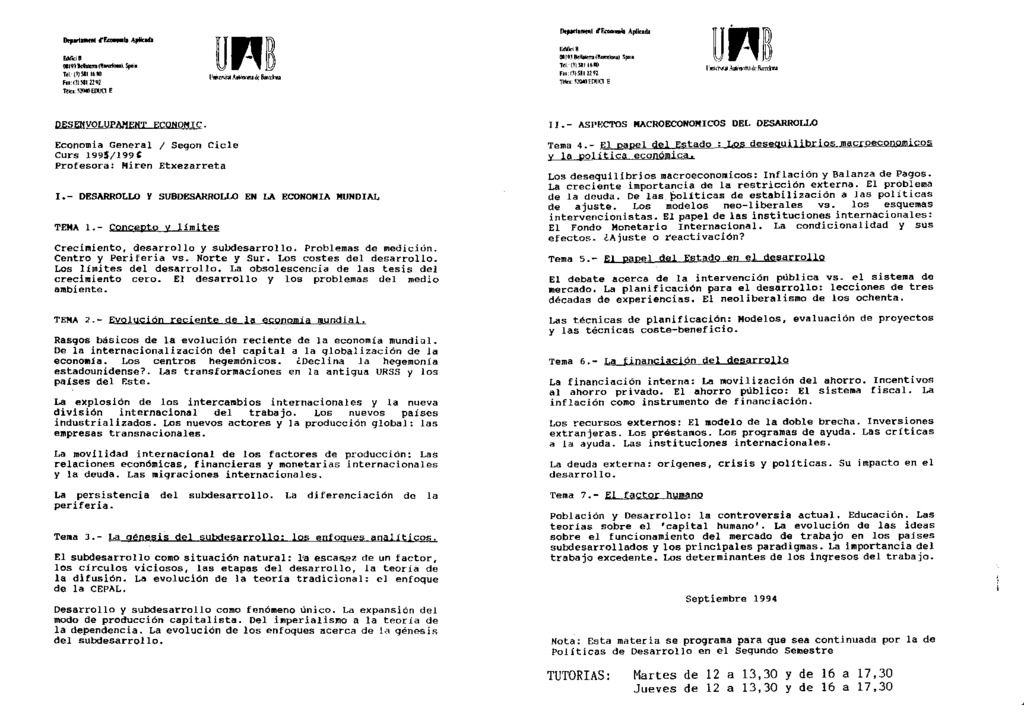 Desenvolupament Econòmic [22607]. Economia General / Segon Cicle Curs 1995/1996 Course guides
Desenvolupament Econòmic [22607]. Economia General / Segon Cicle Curs 1995/1996 Course guides -
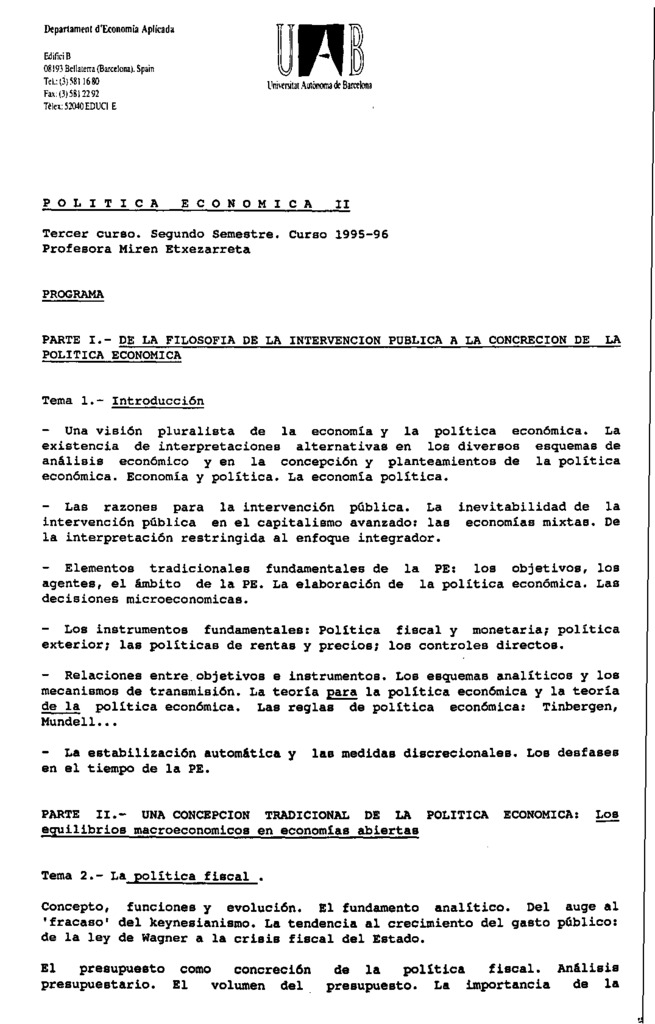 Economía Aplicada (Política Econòmica II) [22345] Tercer curso. Segundo Semestre. Curso 1995-96 Course guides
Economía Aplicada (Política Econòmica II) [22345] Tercer curso. Segundo Semestre. Curso 1995-96 Course guides -
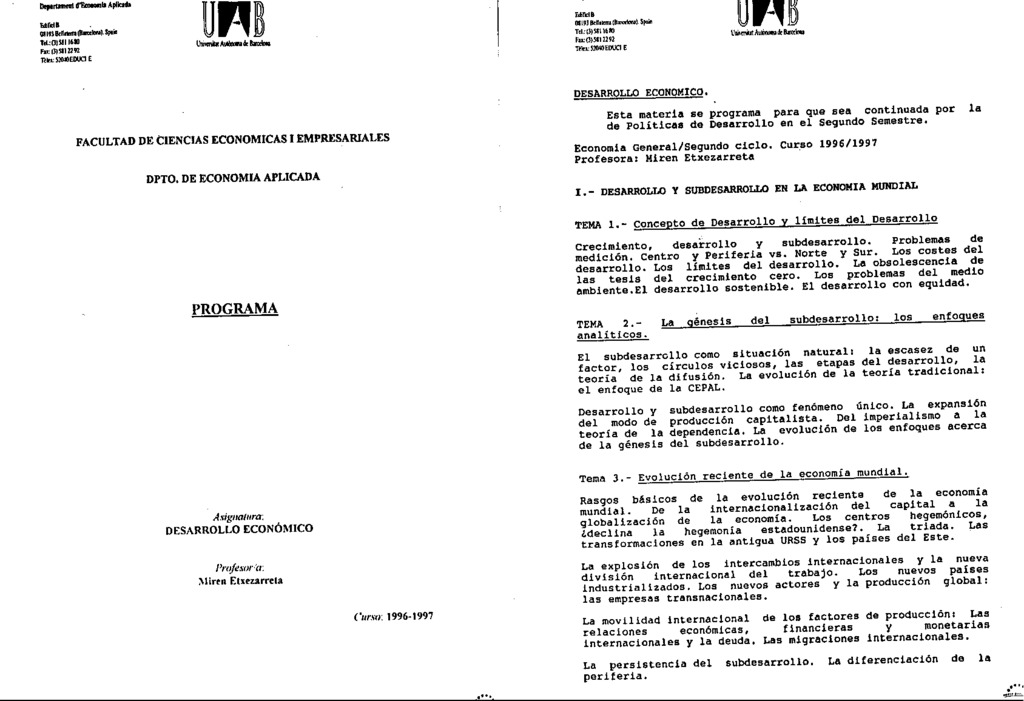 Desenvolupament Econòmic [22607] Economía General/Segundo ciclo. Curso 1996/1997 Course guides
Desenvolupament Econòmic [22607] Economía General/Segundo ciclo. Curso 1996/1997 Course guides -
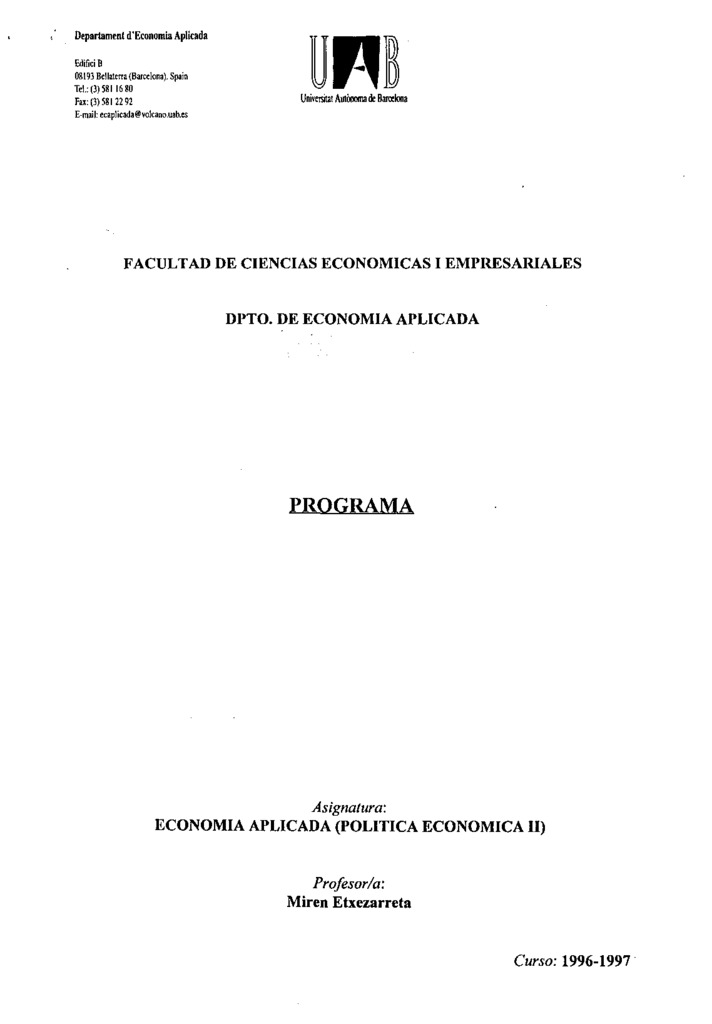 Economia del Sector Públic I [22343] Política económica II - programa 1997 Course guides
Economia del Sector Públic I [22343] Política económica II - programa 1997 Course guides -
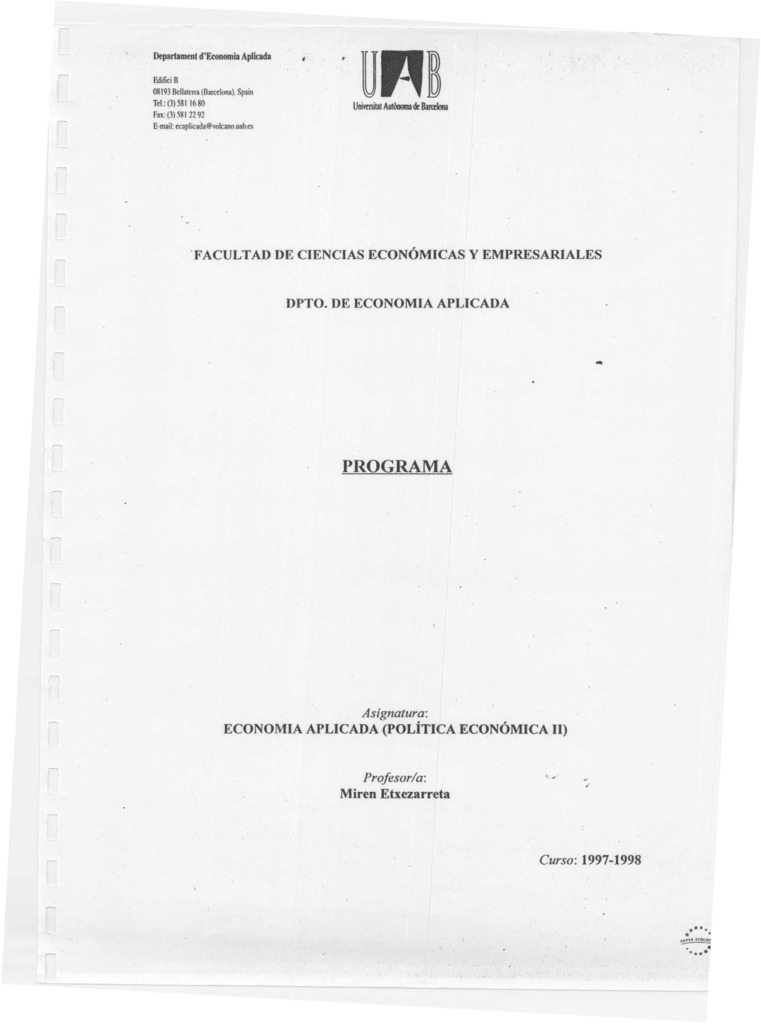 Economia Aplicada [25172] Política económica II - programa 1997 Course guides
Economia Aplicada [25172] Política económica II - programa 1997 Course guides -
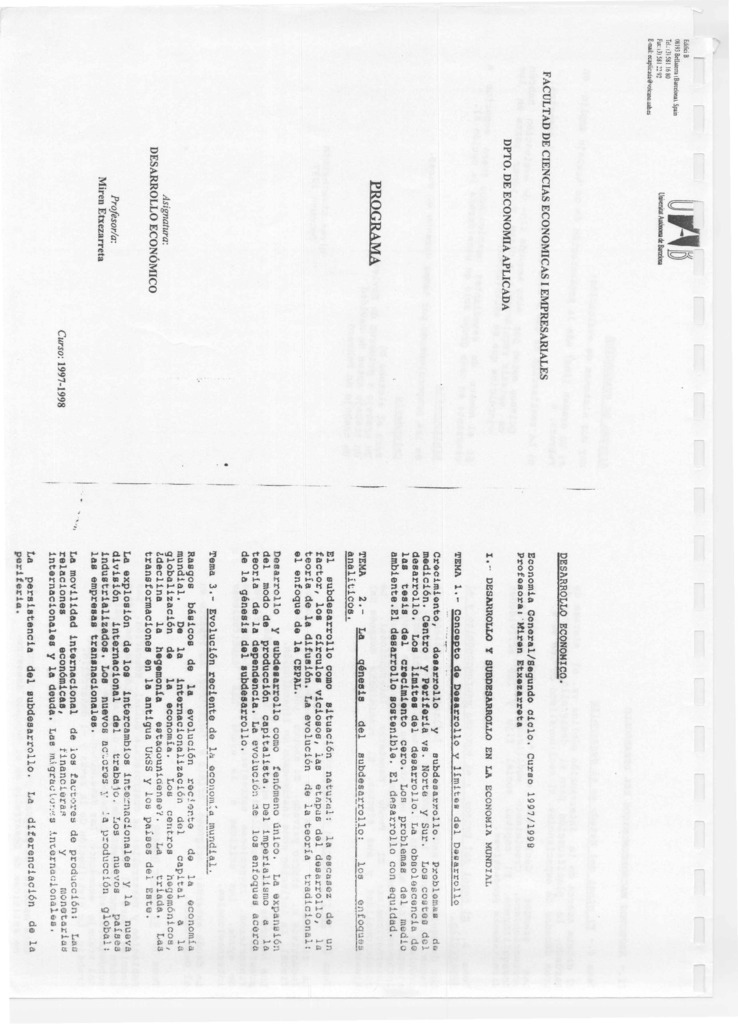 Desarrollo economico I"crèdits reconeguts" [92032] Economía General/Segundo ciclo. Curso 1997/1998 Course guides
Desarrollo economico I"crèdits reconeguts" [92032] Economía General/Segundo ciclo. Curso 1997/1998 Course guides -
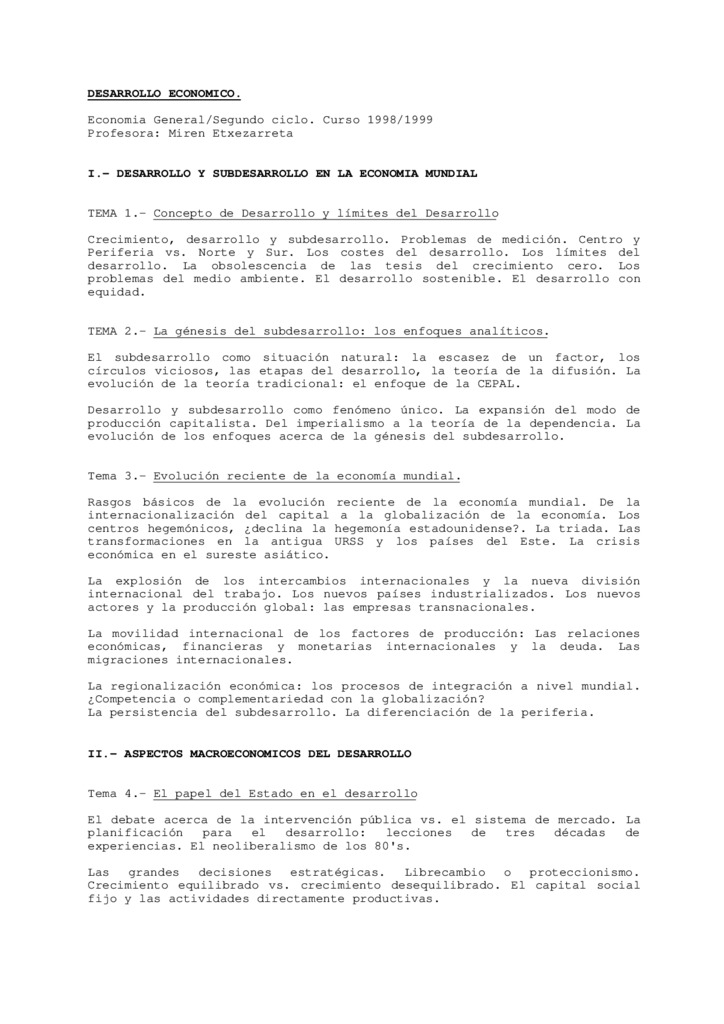 Desenvolupament Econòmic [22607] Economía General/Segundo ciclo. Curso 1998/1999 Course guides
Desenvolupament Econòmic [22607] Economía General/Segundo ciclo. Curso 1998/1999 Course guides -
Desenvolupament Econòmic [22607] Exams
-
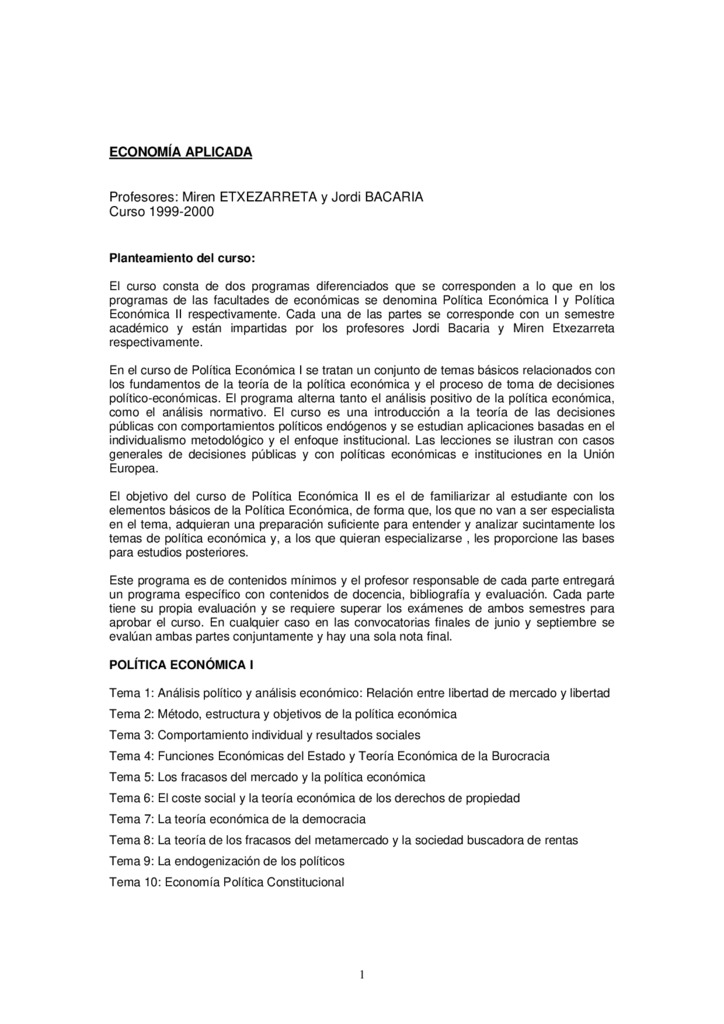 Economia Aplicada [25172] ECONOMÍA APLICADA Profesores: Miren ETXEZARRETA y Jordi BACARIA Curso 1999-2000 Course guides
Economia Aplicada [25172] ECONOMÍA APLICADA Profesores: Miren ETXEZARRETA y Jordi BACARIA Curso 1999-2000 Course guides -
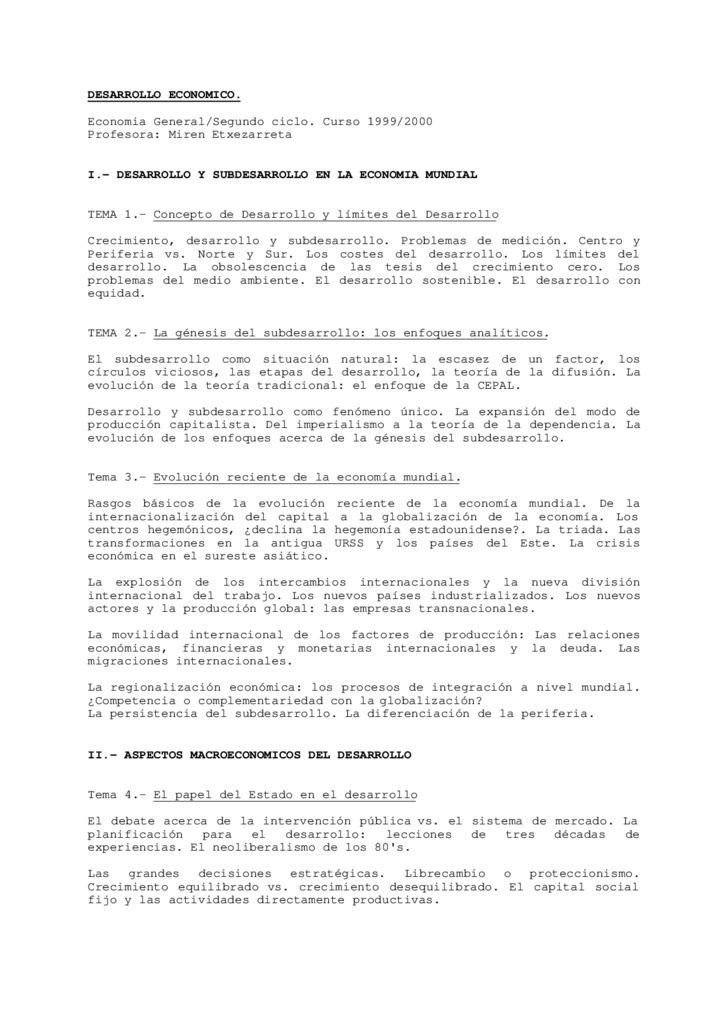 Desenvolupament Econòmic [22607] Economía General/Segundo ciclo. Curso 1999/2000 Course guides
Desenvolupament Econòmic [22607] Economía General/Segundo ciclo. Curso 1999/2000 Course guides -
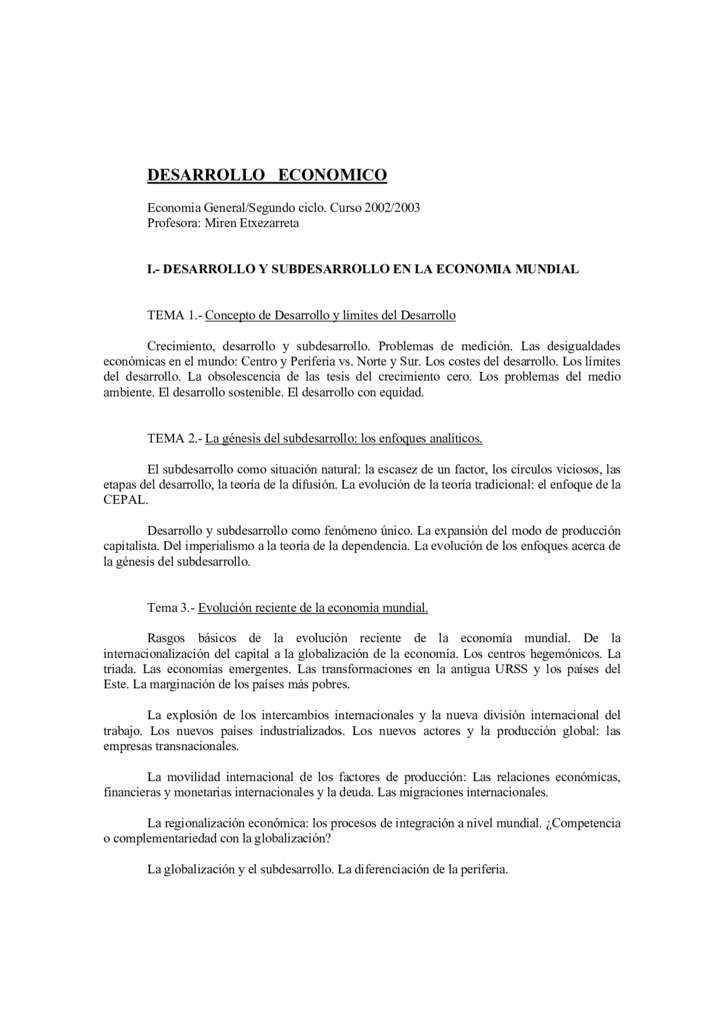 Desenvolupament Econòmic [22607] Economia General/Segundo ciclo. Curso 2002/2003 Guies docents
Desenvolupament Econòmic [22607] Economia General/Segundo ciclo. Curso 2002/2003 Guies docents -
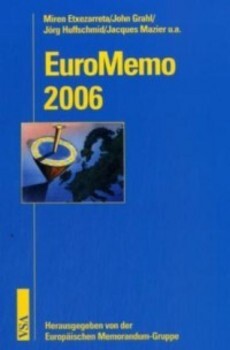 Kurztext: Das EuroMemo 2006 analysiert die wirtschafts- und sozialpolitischen Fehlentwicklungen und zeigt Alternativen auf. In weiteren Beiträgen werden einzelne Aspekte europäischer Politik analysiert. 50 Jahre nach Gründung der Europäischen Wirtschaftsgemeinschaft durch sechs Regierungen ist die EU mit mittlerweile 27 Mitgliedern in vielem zum Gegenteil dessen geworden, was den Bürgerinnen und Bürgern in den 1950er Jahren vorschwebte. Statt einer ökonomisch starken Friedensunion entwickelter Sozialstaaten bildet sich ein marktradikaler wirtschaftlicher Machtblock heraus, dessen Kennzeichen Massenarbeitslosigkeit, wachsende Ungleichheit und Aggressivität nach innen und außen sind. In einem derart unsicheren Umfeld besteht die Herausforderung darin, einen zuverlässigen Rahmen für eine stabile wirtschaftliche und soziale Entwicklung, ökologische Nachhaltigkeit und weltweite Solidarität bereitzustellen. Soucer: EuroMemo
Kurztext: Das EuroMemo 2006 analysiert die wirtschafts- und sozialpolitischen Fehlentwicklungen und zeigt Alternativen auf. In weiteren Beiträgen werden einzelne Aspekte europäischer Politik analysiert. 50 Jahre nach Gründung der Europäischen Wirtschaftsgemeinschaft durch sechs Regierungen ist die EU mit mittlerweile 27 Mitgliedern in vielem zum Gegenteil dessen geworden, was den Bürgerinnen und Bürgern in den 1950er Jahren vorschwebte. Statt einer ökonomisch starken Friedensunion entwickelter Sozialstaaten bildet sich ein marktradikaler wirtschaftlicher Machtblock heraus, dessen Kennzeichen Massenarbeitslosigkeit, wachsende Ungleichheit und Aggressivität nach innen und außen sind. In einem derart unsicheren Umfeld besteht die Herausforderung darin, einen zuverlässigen Rahmen für eine stabile wirtschaftliche und soziale Entwicklung, ökologische Nachhaltigkeit und weltweite Solidarität bereitzustellen. Soucer: EuroMemo -
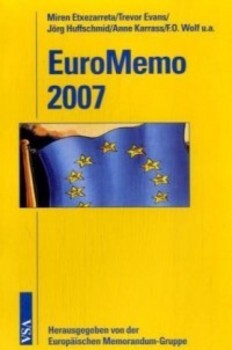 Herausgegeben von der Europäischen Memorandum-Gruppe 216 Seiten (2008) EUR 16.50 sFr 28.90 ISBN 978-3-89965-289-5 The full book can be downloaded here. Kurztext: Das EuroMemo 2007 der "Arbeitsgruppe europäischer WirtschaftswissenschaftlerInnen für eine alternative Wirtschaftspolitik in Europa" wird von mehr als 300 europäischen ÖkonomInnen unterstützt. Sie stellen in diesem Jahr folgende Vorschläge für eine andere Politik zur Diskussion: Um die Finanzkrise zu überwinden und Finanzstabilität in der EU herzustellen, sollten Sofortmaßnahmen gegen die Finanzspekulation mit Schritten zur Stabilisierung und zur Einbettung der Finanzsysteme in Europa in eine kohärente Entwicklungsstrategie verbunden werden. Eine aktivere gesamtwirtschaftliche Politik der EU sollte die Schaffung von mehr und besserer Beschäftigung und eine nachhaltige Entwicklung fördern. Öffentliche Dienstleistungen - oder "Dienstleistungen von allgemeinem Interesse" - müssen nicht nur rhetorisch, sondern auch durch die Politik als ein zentrales Element des europäischen Sozialmodells anerkannt werden, das auf Solidarität und Fairness beruht. Einen besonderen Schwerpunkt sollte die EU auf den Kampf gegen die Armut legen. Die Klima- und Energiepolitik sollte aktiver werden und konkrete Maßnahmen ergreifen, die den Wechsel von dem vorherrschenden fossilen zu einem nachhaltigen Energieregime befördern, das auf Energieeinsparung sowie der Entwicklung und dem Einsatz erneuerbarer Energieträger beruht. In ihren Außenbeziehungen sollte die EU das grundsätzliche Ziel verfolgen, einen tiefgreifenden Übergang zu einem Regime ausgeglichener und gerechter globaler Entwicklung zu fördern. Insbesondere sollte sie eine faire Handelsordnung für Zusammenarbeit und Entwicklung anstreben. Die HerausgeberInnen: Das EuroMemo, das von über 300 europäischen WirtschaftswissenschaftlerInnen unterstützt wird, wird herausgegeben von der Europäischen Memorandum-Gruppe. Inhaltsübersicht EuroMemo 2007: Vollbeschäftigung mit guter Arbeit, ein starker öffentlicher Sektor und internationale Zusammenarbeit - Demokratische Alternativen zu Armut und Unsicherheit in Europa Zusammenfassung Liste der UnterzeichnerInnen des EuroMemo 2007 Anne Karrass/Michaela Moser/Susanne Uhl/Diana Wehlau Armut und soziale Ungleichheit in der Europäischen Union Frieder Otto Wolf/Pia Paust-Lassen Vollbeschäftigung, Nachhaltigkeit und Solidarität - Europäische Energie- und Klimaschutzpolitik in globaler Verantwortung? Trevor Evans Die internationalen finanziellen Turbulenzen Trevor Evans/John Grahl/Jörg Huffschmid/Georges Menahem/Werner Raza/Jan Toporowski Die EU in der Welt
Herausgegeben von der Europäischen Memorandum-Gruppe 216 Seiten (2008) EUR 16.50 sFr 28.90 ISBN 978-3-89965-289-5 The full book can be downloaded here. Kurztext: Das EuroMemo 2007 der "Arbeitsgruppe europäischer WirtschaftswissenschaftlerInnen für eine alternative Wirtschaftspolitik in Europa" wird von mehr als 300 europäischen ÖkonomInnen unterstützt. Sie stellen in diesem Jahr folgende Vorschläge für eine andere Politik zur Diskussion: Um die Finanzkrise zu überwinden und Finanzstabilität in der EU herzustellen, sollten Sofortmaßnahmen gegen die Finanzspekulation mit Schritten zur Stabilisierung und zur Einbettung der Finanzsysteme in Europa in eine kohärente Entwicklungsstrategie verbunden werden. Eine aktivere gesamtwirtschaftliche Politik der EU sollte die Schaffung von mehr und besserer Beschäftigung und eine nachhaltige Entwicklung fördern. Öffentliche Dienstleistungen - oder "Dienstleistungen von allgemeinem Interesse" - müssen nicht nur rhetorisch, sondern auch durch die Politik als ein zentrales Element des europäischen Sozialmodells anerkannt werden, das auf Solidarität und Fairness beruht. Einen besonderen Schwerpunkt sollte die EU auf den Kampf gegen die Armut legen. Die Klima- und Energiepolitik sollte aktiver werden und konkrete Maßnahmen ergreifen, die den Wechsel von dem vorherrschenden fossilen zu einem nachhaltigen Energieregime befördern, das auf Energieeinsparung sowie der Entwicklung und dem Einsatz erneuerbarer Energieträger beruht. In ihren Außenbeziehungen sollte die EU das grundsätzliche Ziel verfolgen, einen tiefgreifenden Übergang zu einem Regime ausgeglichener und gerechter globaler Entwicklung zu fördern. Insbesondere sollte sie eine faire Handelsordnung für Zusammenarbeit und Entwicklung anstreben. Die HerausgeberInnen: Das EuroMemo, das von über 300 europäischen WirtschaftswissenschaftlerInnen unterstützt wird, wird herausgegeben von der Europäischen Memorandum-Gruppe. Inhaltsübersicht EuroMemo 2007: Vollbeschäftigung mit guter Arbeit, ein starker öffentlicher Sektor und internationale Zusammenarbeit - Demokratische Alternativen zu Armut und Unsicherheit in Europa Zusammenfassung Liste der UnterzeichnerInnen des EuroMemo 2007 Anne Karrass/Michaela Moser/Susanne Uhl/Diana Wehlau Armut und soziale Ungleichheit in der Europäischen Union Frieder Otto Wolf/Pia Paust-Lassen Vollbeschäftigung, Nachhaltigkeit und Solidarität - Europäische Energie- und Klimaschutzpolitik in globaler Verantwortung? Trevor Evans Die internationalen finanziellen Turbulenzen Trevor Evans/John Grahl/Jörg Huffschmid/Georges Menahem/Werner Raza/Jan Toporowski Die EU in der Welt -
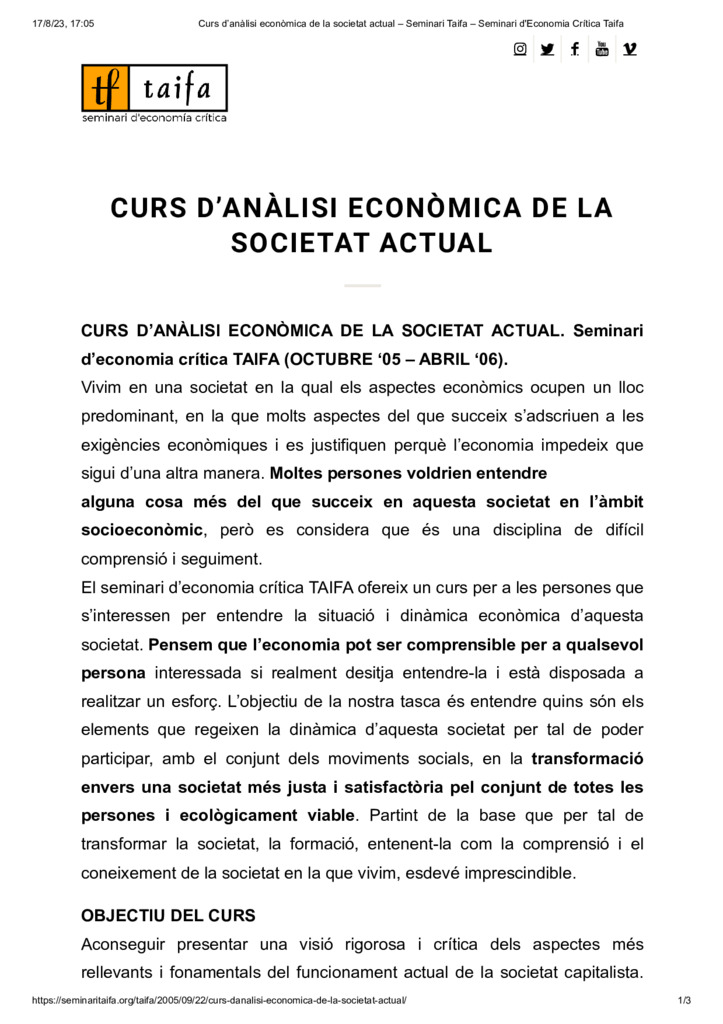 El curs el realitzaran els membres del Seminari Taifa: Josep Manel Busqueta, Àlex Esteban, Miren Etxezarreta, Francisco Ferrer, Núria Giménez, Xabier Gracia, Elena Idoate, José Iglesias Fernández, Joan Junyent, Núria Pascual, Jordi Teixidor. Sessions 1) 19 d’octubre. La societat en la que vivim. Una visió panoràmica. 2) 9 de novembre. L’estructura fonamental d’explotació. 3) 30 de novembre. El sistema productiu. 4) 14 de desembre. El paper de l’estat (1). 5) 11 de gener. El paper de l’estat (2). 6) 1 de febrer. L’evolució de l’estat del benestar: hi ha crisis del sistema de pensions? 7) 22 de febrer. La dinàmica actual del capitalisme. 8) 8 de març. La realitat del projecte europeu. 9) 29 de març. La ciutat en el capitalisme actual. 10) 18 abril. Cap on va el capitalisme. Hi ha alternatives?
El curs el realitzaran els membres del Seminari Taifa: Josep Manel Busqueta, Àlex Esteban, Miren Etxezarreta, Francisco Ferrer, Núria Giménez, Xabier Gracia, Elena Idoate, José Iglesias Fernández, Joan Junyent, Núria Pascual, Jordi Teixidor. Sessions 1) 19 d’octubre. La societat en la que vivim. Una visió panoràmica. 2) 9 de novembre. L’estructura fonamental d’explotació. 3) 30 de novembre. El sistema productiu. 4) 14 de desembre. El paper de l’estat (1). 5) 11 de gener. El paper de l’estat (2). 6) 1 de febrer. L’evolució de l’estat del benestar: hi ha crisis del sistema de pensions? 7) 22 de febrer. La dinàmica actual del capitalisme. 8) 8 de març. La realitat del projecte europeu. 9) 29 de març. La ciutat en el capitalisme actual. 10) 18 abril. Cap on va el capitalisme. Hi ha alternatives? -
 Aquest cap de setmana (13-14-15 de febrer) el grup Economistes Europeus per una Política Econòmica Alternativa (EPOC) organitza una sessió de treball a Barcelona sota el títol: A Work-shop about the future of pension systems: desirable reforms within the public system and scope for improvement in private pensions? A continuació us adjunto el progama: A Work-shop about the future of pension systems: desirable reforms within the public system and scope for improvement in private pensions Organised by the EPOC Network and its Social Policy section. To be held at Barcelona, from the 13th-15th February. Place to confirm later List of persons that have already confirmed their attendance to the Work-shop: Andre Christine, Cepremap, France Balckburn Robin Essex University Concialdi Pierre Ires, France Etxezarreta Miren Universidad Autónoma de Barcelona Lordon Frederic, Cepremap, France Minns Richard Researcher, United Kingdom Sawyer Malcolm University of Leeds Zubiri Ignacio Universidad del País Vasco, Spain The purpose of the Work-shop: For the last two years the EPOC group on Pensions has been analysing the strong trend towards privatisation of the public systems of pensions in the world and especially in the European Union and the will be- new members. Out of this work the group has concluded that the private systems are not better for the welfare of pensioners, the population in general and the functioning of the economy and society than the public systems, and that the danger of an economic crisis of the public systems is rather dubious and in any case much lighter than it is asserted and possible to counter if adequate measures are taken. Therefore it has come out clearly in favour of the maintenance of the public systems and against the development of private systems. The work-shop does not propose to come back to revise those arguments and counter arguments for the privatisation of pensions but considers that they have already been settled for the purposes of our work, therefore the objective of the Workshop is to advance towards the design of improvements of the present public pension systems. However it is recognised that the changes that are taking place in the labour market and in society require to be considered in relation with the public system of pensions if their functionality to increase the welfare of the populations and the efficiency of the system is to be maintained and improved. Because of it, it is considered that a revision of the existing proposals for improvement of the system and an ample debate about the nature and main features of the public pension systems and how to improve them in the future may be of social interest. Also, although the position of the Group is in favour of the reinforcement of the public systems, unfortunately this is not what is happening in our societies and private systems are being developed and expanded mainly under the orientation of public and private organisations that are more preoccupied by budgetary limits of the governments, expansion of financial markets or even only about greater profits for the financial institutions involved. It is considered here that it may be worthwhile too to discuss about the ways in which if private systems are developed they may be socially designed in order to defend and improve the interests of pensioners and stakeholders. We propose to devote the Work-shop to these two aims which are, of course, closely related. Methodology: The idea of the Work-shop is to provide an opportunity for informal discussion about the selected topics in order to advance towards building up some suggestions to improve the present pension systems, with the focus placed about securing the improvement and financial availability of the public pension systems. The plan of the meeting is to devote as much time as possible to discussion of the different issues. Thinking jointly and discussing the more relevant points may be more fruitful than presenting full papers. However, since some of the persons attending the meeting have proposed to present papers, at the Sessions more closely related to the themes of the proposed papers we could start with a short presentation of the papers as an introduction to the discussion. However, forgive me if I stress that we should not think in terms of formal Sessions for presentation of papers but devote most of our time to discussion and drawing of suggestions to improve the present pension systems. Even if a Coordinator is assigned to each session free discussion should be encouraged. Although an Agenda for the meeting is advanced we should consider it in a very flexible way and if we wish to devote more or less time than the proposed to a specific subject changes may be done. Also, although the names of Coordinators are given, please let me know if any of you prefer to coordinate a different Session. Agenda: Friday 13th. 17.00- 17.30: Arrival and welcome 17.30- 19.30 Session 1: Ideas to improve the present public pension systems. Ways in which the present public systems could be improved, from different view points: .. ways to improve and secure the financial availability of the public pension systems: improving the labour market, the scope to increase contributions, the role of taxation ? .. national situations and European convergence: desirability and/or possibilities of convergence of different European systems: establishing minimum or average norms around social/pension expenditure in relation with GDP, replacement rates: relation with wages, minimum wage or poverty levels? .. the special situation of the CEE countries There will be a short paper by P. Concialdi to introduce the subject Coordinator: Pierre Concialdi Saturday 14th 9.30- 11.30 Session 2: Labour markets and Pension systems. How can the public pension systems take into account the changes in the labour market (labour precariousness, new trends in labour careers, self-employment, shorter working lives?) How the efficiency of the present public systems may be improved. Social agents and the pension issue. The role of Unions. The reaction of workers to Pension Reform. Coordinator: Christine André 11.30-12.00 Pause 12.00- 14.00 Session 3: Labour based systems or citizenship based ones? Exploring the scope of citizenship based systems, their impact in society and labour markets, their requirements ( economic and social). May Basic Income be a substitute for pensions or it plays a different role? How to reconcile the egalitarian approach with a maintenance of standard of living approach? The economic requirements of Basic Income; the labour and social requirements. Coordinator: Miren Etxezarreta 14.00-16.00 Lunch 16.00-18.00 Session 4: Towards improvement of the private systems. Main shortcomings of the private systems: uncertainty, high costs, low rewards? The control of managers. The question of participation of pensioners: What type of participation? The problems of representation. Coordinator: Ignacio Zubiri 18.00- 18.30 Pause 18.30- 20.30 Session 5: Pensions are not only pensioners business. Pensions and the accumulation process: the weight of financial interests as limits to improvement of pensions systems. The European Union policies and the pension systems: impact of the Stability and Growth Pact and the building up of an European Integrated financial market in the possibilities of financing better systems. The macroeconomics of pension systems. New ways of financing pensions systems. The real costs of pension systems: fiscal rebates and subsidies (do we have any data about subsidies to private systems?If we had them it may be a good idea to bring them along to allow for more concrete discussions) Coordinators: M. Sawyer and R. Minns Sunday 15th 9.30-11.30 Session 6: Private systems as mechanisms for social participation. The debate about the scope to utilise pension funds as an instrument for social participation. Employees ownership: its possibilities, its risks, its deception. May employees ownership change the distribution of power and the social relations? There will be a paper by R. Blackburn, and it may be one by F. Lordon Coordinators: R. Blackburn and F. Lordon 11.30.12.0Pause 12.00- 14.00 Session 7: Conclusions and recommendations. We should end up with some proposals or at least with the identification of some further fields of work to advance in the desired direction. Coordinator: Miren Etxezarreta Barcelona, 30th January 2004
Aquest cap de setmana (13-14-15 de febrer) el grup Economistes Europeus per una Política Econòmica Alternativa (EPOC) organitza una sessió de treball a Barcelona sota el títol: A Work-shop about the future of pension systems: desirable reforms within the public system and scope for improvement in private pensions? A continuació us adjunto el progama: A Work-shop about the future of pension systems: desirable reforms within the public system and scope for improvement in private pensions Organised by the EPOC Network and its Social Policy section. To be held at Barcelona, from the 13th-15th February. Place to confirm later List of persons that have already confirmed their attendance to the Work-shop: Andre Christine, Cepremap, France Balckburn Robin Essex University Concialdi Pierre Ires, France Etxezarreta Miren Universidad Autónoma de Barcelona Lordon Frederic, Cepremap, France Minns Richard Researcher, United Kingdom Sawyer Malcolm University of Leeds Zubiri Ignacio Universidad del País Vasco, Spain The purpose of the Work-shop: For the last two years the EPOC group on Pensions has been analysing the strong trend towards privatisation of the public systems of pensions in the world and especially in the European Union and the will be- new members. Out of this work the group has concluded that the private systems are not better for the welfare of pensioners, the population in general and the functioning of the economy and society than the public systems, and that the danger of an economic crisis of the public systems is rather dubious and in any case much lighter than it is asserted and possible to counter if adequate measures are taken. Therefore it has come out clearly in favour of the maintenance of the public systems and against the development of private systems. The work-shop does not propose to come back to revise those arguments and counter arguments for the privatisation of pensions but considers that they have already been settled for the purposes of our work, therefore the objective of the Workshop is to advance towards the design of improvements of the present public pension systems. However it is recognised that the changes that are taking place in the labour market and in society require to be considered in relation with the public system of pensions if their functionality to increase the welfare of the populations and the efficiency of the system is to be maintained and improved. Because of it, it is considered that a revision of the existing proposals for improvement of the system and an ample debate about the nature and main features of the public pension systems and how to improve them in the future may be of social interest. Also, although the position of the Group is in favour of the reinforcement of the public systems, unfortunately this is not what is happening in our societies and private systems are being developed and expanded mainly under the orientation of public and private organisations that are more preoccupied by budgetary limits of the governments, expansion of financial markets or even only about greater profits for the financial institutions involved. It is considered here that it may be worthwhile too to discuss about the ways in which if private systems are developed they may be socially designed in order to defend and improve the interests of pensioners and stakeholders. We propose to devote the Work-shop to these two aims which are, of course, closely related. Methodology: The idea of the Work-shop is to provide an opportunity for informal discussion about the selected topics in order to advance towards building up some suggestions to improve the present pension systems, with the focus placed about securing the improvement and financial availability of the public pension systems. The plan of the meeting is to devote as much time as possible to discussion of the different issues. Thinking jointly and discussing the more relevant points may be more fruitful than presenting full papers. However, since some of the persons attending the meeting have proposed to present papers, at the Sessions more closely related to the themes of the proposed papers we could start with a short presentation of the papers as an introduction to the discussion. However, forgive me if I stress that we should not think in terms of formal Sessions for presentation of papers but devote most of our time to discussion and drawing of suggestions to improve the present pension systems. Even if a Coordinator is assigned to each session free discussion should be encouraged. Although an Agenda for the meeting is advanced we should consider it in a very flexible way and if we wish to devote more or less time than the proposed to a specific subject changes may be done. Also, although the names of Coordinators are given, please let me know if any of you prefer to coordinate a different Session. Agenda: Friday 13th. 17.00- 17.30: Arrival and welcome 17.30- 19.30 Session 1: Ideas to improve the present public pension systems. Ways in which the present public systems could be improved, from different view points: .. ways to improve and secure the financial availability of the public pension systems: improving the labour market, the scope to increase contributions, the role of taxation ? .. national situations and European convergence: desirability and/or possibilities of convergence of different European systems: establishing minimum or average norms around social/pension expenditure in relation with GDP, replacement rates: relation with wages, minimum wage or poverty levels? .. the special situation of the CEE countries There will be a short paper by P. Concialdi to introduce the subject Coordinator: Pierre Concialdi Saturday 14th 9.30- 11.30 Session 2: Labour markets and Pension systems. How can the public pension systems take into account the changes in the labour market (labour precariousness, new trends in labour careers, self-employment, shorter working lives?) How the efficiency of the present public systems may be improved. Social agents and the pension issue. The role of Unions. The reaction of workers to Pension Reform. Coordinator: Christine André 11.30-12.00 Pause 12.00- 14.00 Session 3: Labour based systems or citizenship based ones? Exploring the scope of citizenship based systems, their impact in society and labour markets, their requirements ( economic and social). May Basic Income be a substitute for pensions or it plays a different role? How to reconcile the egalitarian approach with a maintenance of standard of living approach? The economic requirements of Basic Income; the labour and social requirements. Coordinator: Miren Etxezarreta 14.00-16.00 Lunch 16.00-18.00 Session 4: Towards improvement of the private systems. Main shortcomings of the private systems: uncertainty, high costs, low rewards? The control of managers. The question of participation of pensioners: What type of participation? The problems of representation. Coordinator: Ignacio Zubiri 18.00- 18.30 Pause 18.30- 20.30 Session 5: Pensions are not only pensioners business. Pensions and the accumulation process: the weight of financial interests as limits to improvement of pensions systems. The European Union policies and the pension systems: impact of the Stability and Growth Pact and the building up of an European Integrated financial market in the possibilities of financing better systems. The macroeconomics of pension systems. New ways of financing pensions systems. The real costs of pension systems: fiscal rebates and subsidies (do we have any data about subsidies to private systems?If we had them it may be a good idea to bring them along to allow for more concrete discussions) Coordinators: M. Sawyer and R. Minns Sunday 15th 9.30-11.30 Session 6: Private systems as mechanisms for social participation. The debate about the scope to utilise pension funds as an instrument for social participation. Employees ownership: its possibilities, its risks, its deception. May employees ownership change the distribution of power and the social relations? There will be a paper by R. Blackburn, and it may be one by F. Lordon Coordinators: R. Blackburn and F. Lordon 11.30.12.0Pause 12.00- 14.00 Session 7: Conclusions and recommendations. We should end up with some proposals or at least with the identification of some further fields of work to advance in the desired direction. Coordinator: Miren Etxezarreta Barcelona, 30th January 2004 -
Bibliografía y material didáctico de las asignaturas Política económica I y II. Esta organizado por años académicos de 1991 al 2005, faltan temas.
-
Curso sobre Economía Mundial y estrategias de política económica impartido en la Universidad de la Habana en enero de 1999. Contiene programa del curso, borrador del temario impartido, "la dinámica de la economía Mundial a finales del siglo XX: ¿hacia la irrelevancia delas periferias?", "Globalización e intervención pública". Incluye "Política macroeconómica. La Escuela New Cambridge, la Keynesiana y la Monetarista" de Keith Cuthbertson Incluye nota de Miren, "curso hecho en Cuba un dossier de lecturas básicas, enero1999"
-
Programa de la asignatura "El sistema Agro-Alimentario Mundial y el desarrollo económico", de 1991 a 1994, contiene bibliografía. Incluye esquema cursillo de doctorado "La agricultura en el desarrollo económico 1978-79" y programa de asignatura "Modelos y estrategias de desarrollo: de la agroindustria a los nuevos procesos de industrialización" 1986
-
Documentación relacionada con el tema 1 de la asignatura "El sistema Agro-Alimentario Mundial y el desarrollo económico". Contiene manuscritos de Miren Etxezarreta, bibliografía, incluye artículos en ingles de William H. Nicholls, Lawrence W. Witt, John W. Mellor y Bruce F. Johnston.
